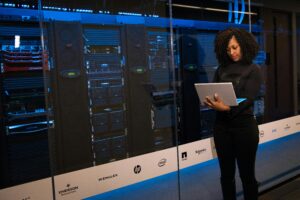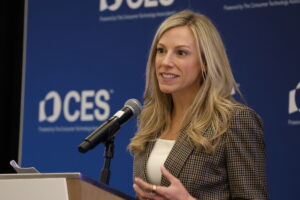Beth Comstock is one of the busiest and most accomplished executives in business and technology today. Previously, she served as President of Integrated Media at NBC Universal, where she oversaw ad sales, marketing and research, and led the company’s digital media development and distribution, including the formation of hulu.com, Peacock Equity and the acquisition of ivillage.com. Beth is a member of Nike’s Board of Directors and Trustee president of the Smithsonian’s Cooper-Hewitt National Design Museum.
LEGACY SERIES: What do you find most rewarding about your work?
Beth Comstock: For me, there’s a rush that comes from successful innovation — of seeing an idea become a breakthrough business that solves a big problem or meets a big need in a given market. It often takes years, sometimes more than a decade, with many failures along the way. But you need the failures to succeed, to paraphrase Thomas Edison.
LS: Can you give us an example?
Beth Comstock: This past summer, we opened a manufacturing plant in Schenectady, New York, where 450 new employees will build the business unit’s flagship product, the Durathon battery. The new battery lasts for nine hours, contains more than 30 patents, can recharge 3,500 times, lasts for two decades and, most exciting, is based upon innovative sodium chemistry that makes it non-toxic. It’s finding a big market among cell tower operators in Africa, where hundreds of millions of people have mobile phones that are improving their quality of life. But the Durathon took years to develop and required incubating the initial idea, supporting it and partnering with smaller companies to get to the finish line.
LS: How has technology influenced your field since you first began? How do you manage the ongoing changes?
Beth Comstock: Disruption used to be measured in decades; now, it can be measured in months. Change, asymmetry and a measure of uncertainty are here to stay. I’m hugely excited about the opportunities this represents. For a big company like GE, it’s meant shifting [our] mindset, embracing the unknown and opening up to the world with open innovation and new partnerships. And it’s transformed the role of marketers. We’re innovators now. Keeping up with rapid change requires listening to your customers and understanding their needs on the ground, in real time, and that’s a role well suited to marketers.
LS: What major changes do you foresee in the pipeline?
Beth Comstock: I’m excited about a big shift that’s coming, which is the emergence of what we call the Industrial Internet, where the world’s machines are coming online and getting connected. When a jet engine can give a status update, it can be maintained and run better, reducing costs for airlines and making them operate more efficiently. From power plants to medical devices, the connection of machines to the Internet is a game changer.
LS: How do you feel customer focus is going to continue to evolve in the next three to five years?
Beth Comstock: Ultimately, we need to get closer to our customers. I like to say, business is social: We have all these great tools now that allow us to communicate and collaborate with our customers. At GE, we have developed smartphone and tablet apps that gather data about how they use our products and that help us forge closer digital bonds. But customer interaction isn’t always driven by technology. The key of “reverse innovation” is learning about local problems and delivering solutions. For that, we use two different but complementary methods of innovating. The first localizes challenges, using the resources, scale and synergies of a global company to get close to different markets. On the ground, we listen to our customers and co-create with them, taking into account special needs and constraints in that particular market.
LS: You’ve already mentioned the shift to open innovation. With what other areas do business and technology leaders need to concern themselves in the near future to position their companies best?
BC: The rapid change and uncertainty created by digital technology can make people feel out of control. None of us are immune to the stresses, but I enjoy the opportunities disruption creates. I’ve always been driven to discover the new and novel. In my early years at GE, I would move to a new assignment every two years. It opens you up to new possibilities. The leaders who are going to succeed foster that sense of curiosity and openness to outside ideas in their people and make it a core part of the organization’s DNA. Perpetual disruption is here to stay, and the more leaders can get their teams to accept that, the better able their business will be to adapt.
LS: How has your background best positioned you for the ongoing changes in the way we do business today?
BC: The lesson that all media companies learned in the last 10-15 years — and this was certainly true of my time at NBC Universal — is that your audience wants to speak to you. This is the case in marketing, as well. Marketers serve as translators. They’re embedded in local markets and with customers, listening and understanding needs and then working with our engineers to get to a solution.
LS: What are you most proud of?
Beth Comstock: Professionally, being part of some exceptional teams where we created energy and momentum to do things that absolutely astonished us. And getting to meet and connect with many interesting people around the world. Personally, I am blessed with a wonderful family.
— August McLaughlin









